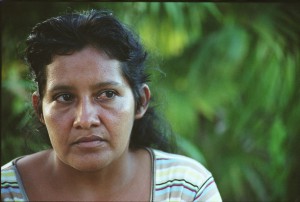Chevron’s last gasps in its fight against the Amazon?
Communities from the Ecuadorian Amazon may finally have what they need to hold Chevron-Texaco accountable for the billions of gallons of oil and toxic wastes dumped into their lands and water.
For almost two decades, communities from the Ecuadorian Amazon have been fighting a long-shot legal battle against Chevron-Texaco for the billions of gallons of oil and toxic wastes dumped into their lands and water (well described in a recent New Yorker piece by Patrick Radden Keefe). With last week’s decision by an Ecuadorian Appellate Court upholding an $18 billion judgment (see prior Oxfam blogging on the case here and here), these communities may finally have what they need to hold the company accountable. Because Chevron has no operations in Ecuador, plaintiffs will need to have the judgment enforced elsewhere. With this decision in hand, they can seek Chevron assets in dozens of countries, including the United States. A memo drafted by plaintiff lawyers details the many options now available to them.
Chevron has gone to unprecedented lengths in fighting this case and its public response to the ruling shows no sign of wavering. Last year, Chevron managed to convince a US federal judge to block enforcement of the case anywhere in the world! That decision—a gross overreach—was fortunately overturned by the US Court of Appeals, making last week’s ruling all the more significant. Chevron continues to litigate the case in the United States and in The Hague, but its prospects for escape are rapidly diminishing. With Chevron also facing a multi-billion dollar lawsuit by the Brazilian government over a recent spill, settling the Ecuador case has to be high on people’s minds.

Barring that, the case will continue to provide a bonanza for at least one law firm. Among the hundreds of lawyers that Chevron has put on this case (according to its own filings), one firm stands out—Gibson Dunn Crutcher has been Chevron’s lead firm since 2009, with at least 60 lawyers associated with the case. As Paul Paz y Mino details in his excellent blog on Huffington Post, Gibson bears much of the responsibility for Chevron’s scorched earth tactics, including some that have led to court sanctions against Chevron and the firm. Given where all of this has now landed Chevron, the company and its shareholders might question the wisdom of paying hundreds of millions of dollars for such aggressive legal tactics.
Ironically, but perhaps tellingly, the American Lawyer instead saw fit to name Gibson its top litigation department of the year, gushing about the firm’s “dogged” representation of Chevron in the Ecuador case and its efforts to attack the plaintiffs (those 30,000 Amazonian residents still living among Texaco-Chevron’s waste 40 years later): “Led by Randy Mastro and Andrea Neuman, the firm immediately went on the offensive, beginning a tireless campaign to unearth evidence to try to discredit the plaintiffs and exonerate their client.”
The year 2011 was a big one for business and human rights, with the launch of the first-ever UN-endorsed human rights code for corporations (described in a prior blog). As businesses in their own right, some major law firms have begun considering their responsibilities to respect human rights, even while providing vigorous defense to corporate clients. We can reasonably hope that sometime soon, instead of lauding the likes of Randy Mastro, the American Lawyer might call into question the pursuit of aggressive attacks against plaintiffs and their attorneys as a way to for a company like Chevron to escape responsibility for evident and widespread human rights abuses.
Editor’s note: See here and here for additional articles written by Chris Jochnick.